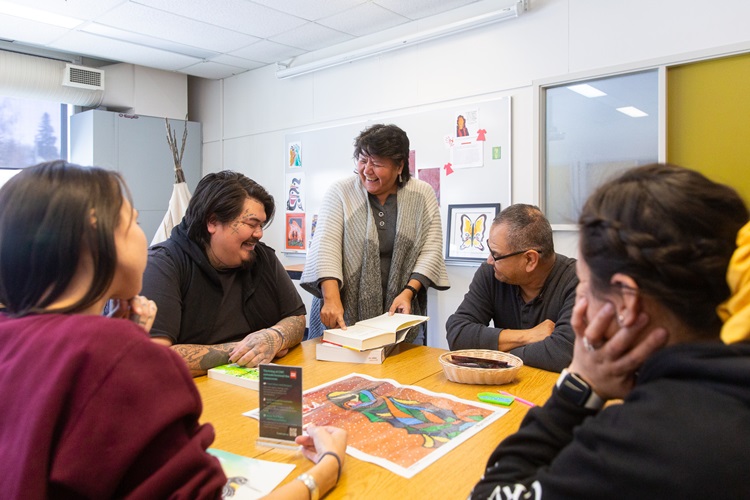Content note: this article includes mention of intergenerational trauma and abuse, which may be upsetting for some readers. If you are a CNC student or employee in need of mental health support, please contact our counsellors. Visit First Nation Health Authorities for an overview of culturally safe and trauma-informed support services to Indigenous Peoples in B.C.
The terms ‘Indigenous’ / ‘Aboriginal’ and ‘Wet'suwet'en’ / ‘Witsuwit'en’ are used interchangeably throughout this article to honour the preferences of Indigenous Peoples in the region that CNC serves.
You’ve joined CNC’s list of College authors with your memoir Alha Disnii. Why was it important for you to put your life story into a written form?
I started thinking about writing a book at least 20 years ago, probably after I went back to school. I wanted to honour my parents, grandparents, great-grandparents, and ancestors. Their ways and experiences and our culture have been really important and foundational in who I am today. I also wanted to provide people with an understanding of my experiences as a Wet’suwet’en woman, the daughter of a residential school survivor and a WWII veteran, and my traumas with abuse and (lateral) violence.
I thought it was important to speak to the nature of trauma, how my experiences with trauma have affected me, and how I moved through my trauma and started on a path of healing. Especially during this time as we collectively try to navigate the landscape of
Truth and Reconciliation and the
United Nations Declaration on the Rights of Indigenous Peoples.
For whom did you write the book?
Initially, I wanted to speak to the young people and share my experiences as a young Aboriginal woman. During the writing process, I realized that this could be written for a much broader audience and people with various backgrounds, ages, cultures, education, etc.
I also hope that my book provides elements of healing for people who experienced trauma in their own lives, and awareness for those seeking to understand and learn who we are as Aboriginal people.
Since the book got published, I received positive feedback from youth to different post-secondary institutions across Canada. Since Alha Disnii became available globally, I'm really beginning to see how much the sharing of my experiences has reached so many different people. My life is literally an open book now.
Growing up off-reserve along the Highway of Tears in northwest B.C., you were one of few Aboriginal students in a predominately white preschool, elementary, and high school environment. How was that experience for you?
It was hard for me to fit in as I was visibly different. While some of those learning experiences were very conflictual, I also feel I had access to the best of both worlds. I would go to school during the day and pick up the tools of western education; in the evenings, weekends and during breaks, I got to really immerse myself into my history, culture and ancestors’ beliefs.
"I remember this one moment in fourth grade where my mom and dad came into my class to speak about who we were. At that time, we were called Carrier Indians. I was grinning ear to ear and beaming with pride as they were sharing our culture with my classmates."
When I did my undergraduate, I often focused on addressing themes and events in an Aboriginal context as part of our collective history. Today, I’m able to fuse those two and use both aspects of knowledge to create a more holistic understanding between Aboriginal and non-Aboriginal people in the community.”

Murray Sinclair, the late and former and Truth & Reconciliation Commission chief commissioner (CBC Radio, 2015), believed that education is a key part of reconciliation. Referring to the residential school system, he said that “education got us into this mess and education will get us out of it”. In your experience working at CNC, how do you feel that staff and faculty can support reconciliation?
With Murray Sinclair’s passing, more than ever, I wish to honour his legacy of speaking the truth and striving for reconciliation. His drive and vision were so inspirational. I hope that we all continue to listen to and honour the truth and help each other understand what that means for each of us.
I'm hopeful that through my experiences as a young child in Telkwa Elementary School all the way through completing part of my PhD, I'm able to better understand what is necessary for student success. I also actively try to include components of Aboriginal culture and history in what we do and teach at the College and in the community.
Can you share what "truth" means to you?
My mother is a fluent Witsuwit'en speaker and she helped me select the title for my book. While we used ‘My Truth’ as the anglicized title of my book, the literal translation of Alha Disnii is ‘I am speaking the truth’. The Witsuwit'en language is packed with meaning, and you oftentimes need an English translation into multiple words. For me, when I say that I am speaking the truth, I share who I am; the core of my being and my experiences. I share what really happened to me as a Wet’suwet’en woman.
Whenever possible, I talk with students and my colleagues about my own experiences and those of my ancestors. At the campus in Burns Lake, I taught classes and have given workshops. I introduce myself in Witsuwit’en. People often tell me how powerful it is to share the beauty of the Elders.
Through moments and interactions like that, I am telling the truth.
My truth.
Corinne’s book is available through
Medicine Wheel Publishing and larger booksellers. Sage Birchwater recently published a rave review of Alha Disnii on the
British Columbia Review.